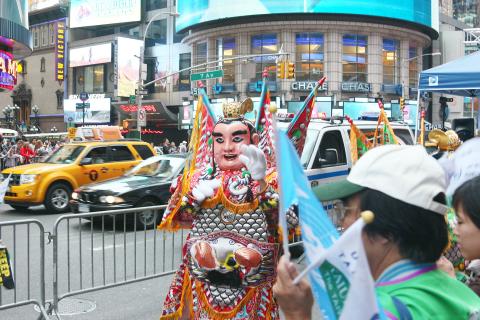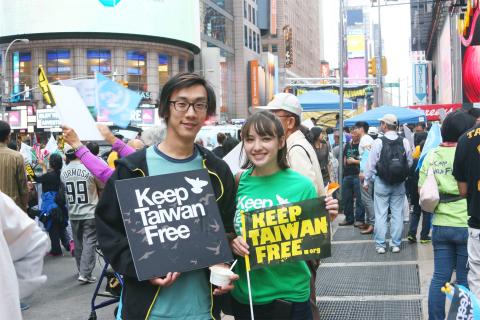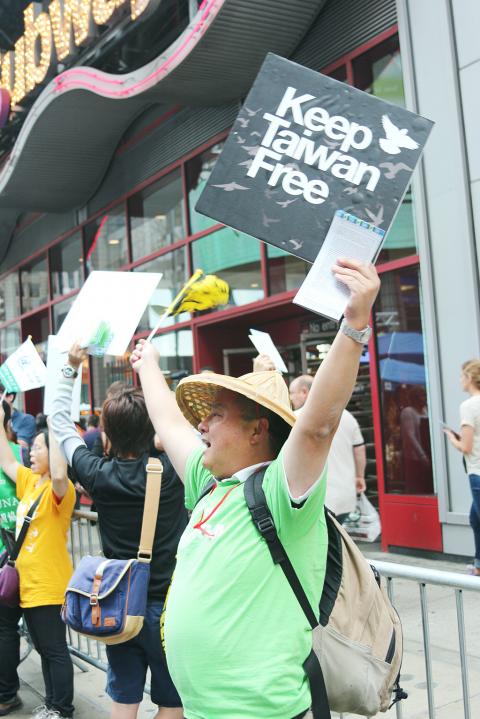Amid overcast skies and a steady rain that fell for much of the afternoon, more than 200 Taiwanese converged on Times Square Saturday to call for Taiwan’s inclusion in the UN, and to raise New Yorkers’ awareness of the island nation and its political struggles.
“If you want to love Taiwan, then you have to learn about Taiwan,” said Eric Tsai (蔡宗霖), 23, co-director of this year’s Keep Taiwan Free rally.
Tsai, who was born in California and grew up in Taiwan, said they also circulated two petitions among attendees: one to demand that Taiwan’s government amend a law requiring at least 50 percent voter turnout to pass a referendum, the other to ask that US Secretary of State John Kerry review the one-China policy recognizing the People’s Republic of China (PRC) as the legitimate representative of China.

Photo: Chris Fuchs
Since 1993, overseas Taiwanese in New York have participated in this annual rally, also attended by the Taiwan United Nations Alliance (台灣聯合國協進會). In the past, Tsai said, thousands of protesters would descend on the Manhattan streets outside the UN, which gave the island’s seat to the PRC in 1971.
Sovereignty
Taiwan is one of only three countries not in the UN. The PRC has repeatedly blocked efforts by Taiwan to join, arguing that the nation, which it views as a breakaway province, is not a sovereign nation.

Photo: Chris Fuchs
Organizers chose to hold this year’s event in Times Square and did not march to the UN since the 69th General Assembly does not convene until Sept. 16, Tsai said. They were also hoping to attract a younger generation of Taiwanese to augment the ranks of older participants who have been active in this movement for decades, he said.
The dreary weather Saturday did not dampen the spirits of those who attended the three-hour rally. To keep the crowd energized, live bands performed on a makeshift stage, penned in by metal police barricades, and the Taiwanese American Association of New York (大紐約區台灣同鄉會) Santaizi (三太子) Troupe, dressed in colorful head-to-toe costumes of various gods and deities, strutted their stuff in front of smiling protesters waving yellow-and-black flags that read Keep Taiwan Free.
Education

Photo: Chris Fuchs
This year’s event also helped educate everyday New Yorkers about Taiwan, organizers said. Dressed in Keep Taiwan Free t-shirts, many attendees lined up along the sidewalk barriers set up by police, handing out literature and flags to passersby as they made their way down 42 Street.
One participant, Melissa Daly, 23, said she made the trek in from nearby New Jersey with her friend Jenny Wang (汪采羿), her high school classmate, also 23, and the event’s other co-director. But Daly said she also has a personal investment in the movement — she is half-Taiwanese.
“When people think Taiwan is part of China, I always feel the need to say something,” said Daly, whose mother was born and raised in Taiwan.
Jason Chen, 23, also attended the rally after learning about it through his friend Daly. Like the others, Chen, whose parents are from Taiwan, echoed a similar sentiment that Taiwan should finally be allowed into the UN to join the international community of nations.
He also said he views himself as a cultural ambassador for Taiwan.
“When people ask, I try to be informative and paint a good picture of Taiwan and Taiwanese values,” Chen said.
In the long run, organizers explained, outreach to overseas Taiwanese and Americans alike is an important step toward countering the growing threat that China poses to this democratic island nation.
“It takes time,” Wang said. “But right now, we’re in Times Square. People are going to see this, and maybe they’ll Google it. It’s little events like this one that make a difference.”

Last week, the the National Immigration Agency (NIA) told the legislature that more than 10,000 naturalized Taiwanese citizens from the People’s Republic of China (PRC) risked having their citizenship revoked if they failed to provide proof that they had renounced their Chinese household registration within the next three months. Renunciation is required under the Act Governing Relations Between the People of the Taiwan Area and the Mainland Area (臺灣地區與大陸地區人民關係條例), as amended in 2004, though it was only a legal requirement after 2000. Prior to that, it had been only an administrative requirement since the Nationality Act (國籍法) was established in

Three big changes have transformed the landscape of Taiwan’s local patronage factions: Increasing Democratic Progressive Party (DPP) involvement, rising new factions and the Chinese Nationalist Party’s (KMT) significantly weakened control. GREEN FACTIONS It is said that “south of the Zhuoshui River (濁水溪), there is no blue-green divide,” meaning that from Yunlin County south there is no difference between KMT and DPP politicians. This is not always true, but there is more than a grain of truth to it. Traditionally, DPP factions are viewed as national entities, with their primary function to secure plum positions in the party and government. This is not unusual

The other day, a friend decided to playfully name our individual roles within the group: planner, emotional support, and so on. I was the fault-finder — or, as she put it, “the grumpy teenager” — who points out problems, but doesn’t suggest alternatives. She was only kidding around, but she struck at an insecurity I have: that I’m unacceptably, intolerably negative. My first instinct is to stress-test ideas for potential flaws. This critical tendency serves me well professionally, and feels true to who I am. If I don’t enjoy a film, for example, I don’t swallow my opinion. But I sometimes worry

US President Donald Trump’s bid to take back control of the Panama Canal has put his counterpart Jose Raul Mulino in a difficult position and revived fears in the Central American country that US military bases will return. After Trump vowed to reclaim the interoceanic waterway from Chinese influence, US Defense Secretary Pete Hegseth signed an agreement with the Mulino administration last week for the US to deploy troops in areas adjacent to the canal. For more than two decades, after handing over control of the strategically vital waterway to Panama in 1999 and dismantling the bases that protected it, Washington has